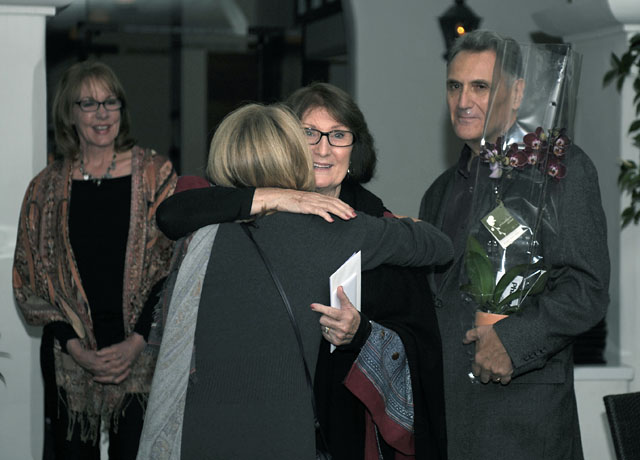Joan of DARC Sheathes Her Sword
Dyslexia Awareness and Resource Center Closes Its Doors

When Lowell Boardman’s daughter was a little girl, she loved books. So it came as a surprise to him when she got to grade school and her teachers said she couldn’t read. Turns out she had memorized the stories her parents read to her, but a processing disorder made actual reading a challenge. Now, she’s a medical student at Emory University.
The Boardmans give much of the credit for her success to Joan and Les Esposito, who for 21 years ran the Dyslexia Awareness and Resource Center in Santa Barbara, advocating for children and adults with learning disabilities while hooking them up with the proper resources. In October, they shut down their operation and donated a considerable library to the Santa Barbara school district.
The Espositos had hoped to hand off the center to new leadership or to have another organization annex it, but they couldn’t work out a plan. Part of the difficulty was in securing funding. Compounding matters was the fact that the Espositos did not pay themselves market-rate salaries, which a new executive director would demand. “No one else would have let me do this work for free for years,” said Joan, referring to Les, a former Catholic priest. “Any other man would have said, get a real job.”
And perhaps Joan Esposito stepped on a toe or two. She would lobby school districts for her clients, sometimes sue them, and often sit in on Individualized Education Plan (IEP) meetings for special-education students. At a retirement party for the Espositos a couple of weeks ago, neuropsychologist Jordan Witt told a story about one IEP he attended with Esposito. It was for a high school senior who would have difficulty graduating on time. His teachers suggested that he finish his coursework over the summer, meaning he would not walk for graduation. They asked him if he was okay with that. He said yes. His mother agreed. Then Esposito stepped in, telling the student that one day, “You will look back and remember that you didn’t cross the stage with your class or attend your senior party because you are dyslexic.”
Perhaps Esposito was so sensitive because she suffered a similar fate as a young Liverpudlian. In one essay of hers, she reminisced about the pain of sitting in a classroom hoping she wouldn’t be called on to read. “Maybe I can’t spell because I am the fifth of six children and they got all of the brains from my parents and left none for me,” she would think to herself. “I must never have any children in case they inherit my damaged brains.” (Esposito did have a son, and he was dyslexic. It was his diagnosis that would lead to hers.)
Kate Smith, the irascible former school board candidate and semipro public commenter, nicknamed Esposito Joan of DARC, a clever pun that quips on Esposito’s crusade-like approach to her work but also gestures to the deep pain that can be evoked by learning disabilities. Several of Esposito’s clients came to her on the verge of suicide. Some followed through. One of her more high-profile cases was Sarah Alvarado, who killed herself by standing in front of a train in 1995 after failing to graduate from Santa Barbara High School.
Experiences like this caused Esposito, who finally learned to read at the age of 44 at Santa Barbara City College, to rail against the county’s truancy program and other measures that punished wayward kids rather than seek the source of their alienation. Because those with disabilities like dyslexia and ADD look, on the surface, like anyone else, they often slip through the cracks, banished to the justice system for avoiding school or acting out, treated like “throwaways,” as Joan would say. When she finally had herself assessed positively for ADD and dyslexia and then became a self-trained expert, it was like gradually emerging from Plato’s cave. She could see illiterates everywhere, spinning wheels in bureaucracies that ignored them, or worse, exacerbated their helplessness.
After two-plus decades in the trenches, Joan has developed a gimlet eye and a jaded perspective. Theresa Gorey, a learning specialist at Crane Country Day School, called her a “righteous warrior,” but a warrior nonetheless who would proclaim publicly that schools would rather spend money on lawyers than on their students. Joan said she now feels like she has PTSD after battling for so many years and seeing so many casualties. While she would often focus on the failures, all the parents, children, and educators who paid homage to the Espositos at their send-off indicated that there were more than a few successes, as well. “She was successful for one reason,” said Les. “We’re here for the children.”


